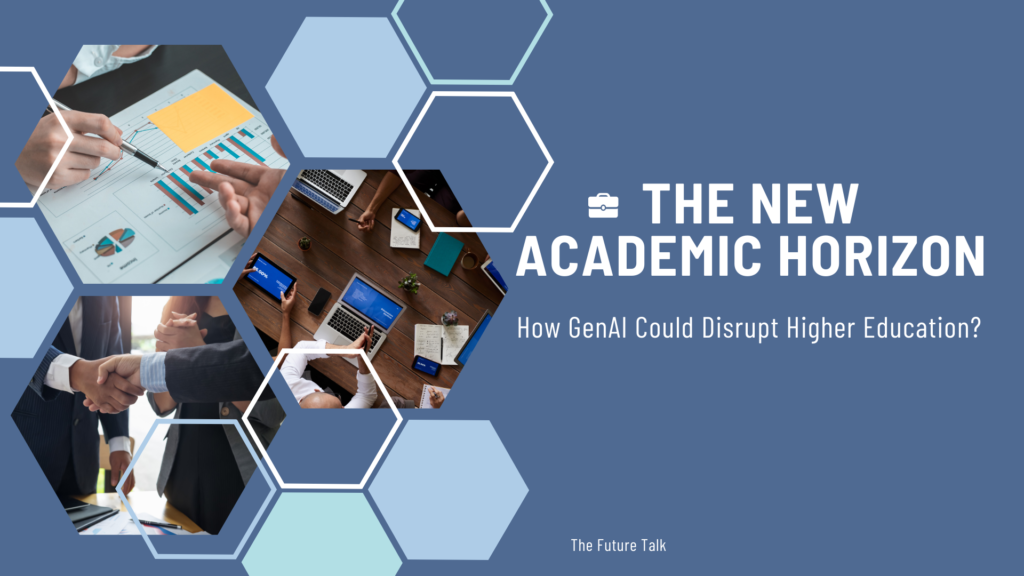Embracing GenAI responsibly and inclusively could create a more adaptive and responsive educational landscape in the future.

The introduction of AI tools such as ChatGPT, Gemini and others has sparked the debate on how our future would be, especially the education sector. GenAI is a specific form of AI that has rapidly evolved as a transformative technology across various industries. It has the potential to transform the traditional educational landscape that goes far beyond content generation.
As many reports suggest GenAI is set to shake up education, particularly higher education, the global Generative AI market in Education is estimated to reach US$ 7,701.9 million by 2033. The market is up from US$ 299.8 million in 2023, growing at a CAGR of 39.5% during the forecast period 2024-2033, according to MarketReasearch.biz.
Also Read: The Double-Edged Sword: The Impact of AI on Academic Integrity
Understanding What and Why of Generative AI
Generative AI, or GenAI, is a subset of artificial intelligence (AI). It emphasizes creating content autonomously and simulating human-like creativity while possessing problem-solving capabilities.
GenAI has a range of applications, including natural language processing (NLP), data analysis, image generation, and predictive modeling. The technology is already creating its impact across industries, ranging from automotive to natural science, and entertainment.
Potential Disruptions of GenAI in Higher Education
The potential impact of GenAI can already be seen through GenAI writing tools such as ChatGPT, Microsoft Bing Chat, Google Bard, or Meta Llama. According to a study(tytonpartners.com/app/uploads/2023/10/GenAI-IN-HIGHER-EDUCATION-FALL-2023-UPDATE-TIME-FOR-CLASS-STUDY.pdf), 49% of college students are leveraging GenAI.
In addition, 75% of faculty using GenAI believe graduates should know how to effectively use GenAI tools to succeed in a professional setting.
GenAI has a significant impact on higher education.
Personalized Learning Experiences
One of the promising influences of GenAI in education is its ability to personalize learning experiences. AI is able to customize the pace and content based on each student’s learning style and aptitude by analyzing enormous amounts of student data. This creates an adaptive learning environment, enhancing student engagement and learning outcomes.
Curriculum Design and Content Creation
By using GenAI, universities and academia can design dynamic and responsive curricula in response to real-time data analytics and industry trends. AI algorithms can help them create educational materials, textbooks, and interactive resources, ensuring relevance and up-to-date information.
Tools like ChatGPT-4 can help generate comprehensive educational content, such as textbooks or study guides. Coursera, for example, uses AI to help teachers devise lesson planning while providing personalized feedback for students. It also helps them make plans to leverage machine learning for course language translations, among other new platform features.
Research and Data Analysis
The ability of AI to process and analyze data can completely transform higher education research. The technology can greatly improve university research capacities by accelerating data-intensive projects and identifying patterns and insights that human researchers might miss.
For example, IBM Watson in Medical Research. Medical researchers have employed IBM Watson for the analysis of big datasets derived from clinical trials and medical records. For instance, it can be used to cross-reference symptoms, treatments, and results in order to find new drug therapies or comprehend the adverse effects of existing prescribed ones.
Support Services and Student Engagement
GenAI makes support services and student engagement possible. AI chatbots and virtual assistants can answer questions from students regarding classes, timetables, and campus life around the clock. In order to anticipate and take action in situations where students might require extra support, these AI-driven systems can also evaluate student behavior and engagement.
Also Read: How AI in Education is Transforming The Future of Learning
GenAI in Higher Education: Challenges and Considerations
The integration of Generative AI (GenAI) into higher education has a wide range of benefits. However, it also presents a number of challenges and ethical considerations that institutions must address to ensure responsible and effective use of AI technologies in educational settings.
- Ethical Use of Data
Whether it is for improving research, automating grading, or customizing learning experiences, AI systems rely significantly on data to work well. Sensitive personal information about students, including their academic standing, behavioral tendencies, and in certain situations, biometric data, is frequently included in this data.
The potential misuse or mishandling of this data gives rise to ethical questions. Data breaches are a possibility, wherein private information is accessed by unauthorized persons. Furthermore, biases found in the data that AI algorithms are trained on may unintentionally be reinforced by the algorithms, producing unfair or discriminatory results.
- Impact on Employment
Concerns regarding job displacement may arise when AI-driven automation is used in higher education, especially for administrative and teaching staff. Since AI is capable of handling repetitive tasks, the reduction of human roles—which have historically been crucial to the educational process—is a cause for concern.
This could result in employees losing their jobs or necessitate extensive retraining to transition to new positions managing AI systems instead of carrying out duties directly.
- Skill Gaps and Adaptation
To effectively use these technologies, instructors, administrators, and students must acquire new skills as part of the integration of GenAI into higher education. The challenges stem from the skill gaps that currently exist in the education industry, where many experts lack the technical know-how required to fully utilize AI systems.
The challenges that arise with the integration of GenAI into higher education are not impossible to address. Education institutions can take advantage of GenAI while maintaining a responsible and inclusive approach through reskilling and upskilling, and closing skill gaps with personalized training.
The Final Thought
Generative AI (GenAI) holds immense potential to revolutionize research capacities, improve learning experiences, and automate administrative activities in higher education. Universities and other educational institutions must carefully navigate challenges to fully utilize GenAI and address ethical, sociological, and practical considerations.
I want to thank you for your assistance and this post. It’s been great.
Great content! Super high-quality! Keep it up!